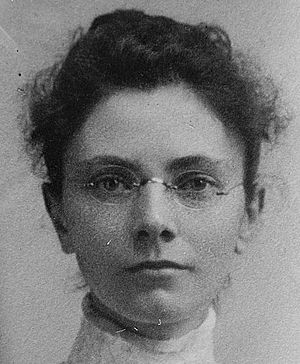Anne Sewell Young facts for kids
Quick facts for kids
Anne Sewell Young
|
|
|---|---|
 |
|
| Born | January 2, 1871 |
| Died | August 15, 1961 (aged 90) |
| Education | Carleton College Columbia University |
| Scientific career | |
| Fields | Astronomy |
| Institutions | Whitman College Mount Holyoke College |
| Thesis | Rutherford Photographs of the Stellar Clusters h or x Persei |
Anne Sewell Young (born January 2, 1871 – died August 15, 1961) was an important American astronomer. She taught astronomy at Mount Holyoke College for 37 years, helping many students learn about the stars.
Contents
Anne Sewell Young's Life
Anne Sewell Young was born in Bloomington, Wisconsin on January 2, 1871. Her parents were Reverend Albert Adams Young and Mary Sewell.
Education and Early Career
Anne earned her first degree, a B.L., from Carleton College in Minnesota in 1892. After that, she moved to Walla Walla, Washington. There, she taught math at Whitman College for three years. She then went back to Carleton College and earned her M.S. degree in 1897.
She continued her studies and earned her Ph.D. from Columbia University in 1906. For her Ph.D. project, she studied old photographs of stars. She found that the constellation Perseus had twice as many stars as people thought before.
Work at Mount Holyoke College
Young began working at Mount Holyoke College in 1898. She became the director of the John Payson Williston Observatory. At the observatory, she led a program to track sunspots. Sunspots are dark spots that appear on the Sun's surface.
She also organized special events at the observatory for Mount Holyoke students. For example, in 1925, she arranged for students to travel by train to central Connecticut. They went there to watch a total solar eclipse. This was a very exciting event for them!
In 1929, Young made an important discovery. She identified the comet 31P/Schwassmann–Wachmann. This comet had been mistakenly identified as a small planet in 1904.
Interest in Variable Stars
Anne Young was very interested in variable stars. These are stars whose brightness changes over time. She often wrote about this topic to Edward Charles Pickering. He was the director of the Harvard College Observatory.
She was also one of the first eight members of the American Association of Variable Star Observers (AAVSO). This group studies variable stars. Young contributed over 6,500 observations of variable stars to the AAVSO. In 1923, she was chosen as the president of the organization.
Retirement
Anne Young retired in 1936. Her former student, Alice Hall Farnsworth, took over her role as director of the Williston Observatory. After retiring, Young moved to Claremont, California with her sister. She passed away there on August 15, 1961.
See also
 In Spanish: Anne Sewell Young para niños
In Spanish: Anne Sewell Young para niños
 | Lonnie Johnson |
 | Granville Woods |
 | Lewis Howard Latimer |
 | James West |

